 Petzlover
Petzlover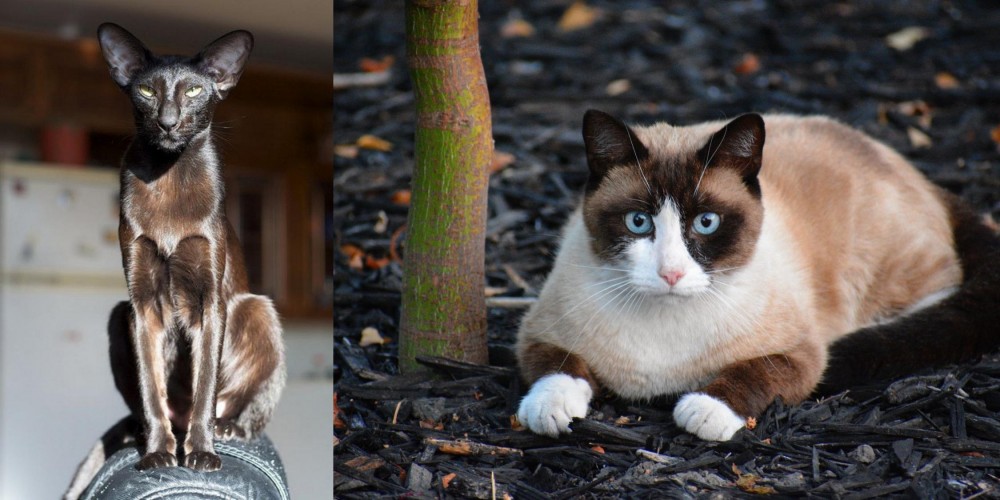 Oriental Shorthair is originated from United Kingdom but Snowshoe is originated from United States. Both Oriental Shorthair and Snowshoe are having almost same weight. Both Oriental Shorthair and Snowshoe has same life span. Both Oriental Shorthair and Snowshoe has same litter size. Both Oriental Shorthair and Snowshoe requires Low Maintenance.
Oriental Shorthair is originated from United Kingdom but Snowshoe is originated from United States. Both Oriental Shorthair and Snowshoe are having almost same weight. Both Oriental Shorthair and Snowshoe has same life span. Both Oriental Shorthair and Snowshoe has same litter size. Both Oriental Shorthair and Snowshoe requires Low Maintenance.
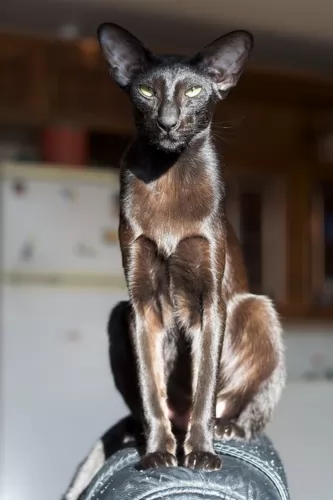 This domestic cat is also related to the Siamese Cat. Orientals come from a diverse group of cats, but they have their foundation in the Siamese breed.
This domestic cat is also related to the Siamese Cat. Orientals come from a diverse group of cats, but they have their foundation in the Siamese breed.
The cat was imported from Thailand to the UK during the 1800s. This particular cat was accepted as an actual breed in 1977. Quite a few of the top cat organizations recognize the Oriental Shorthair but as a Siamese.
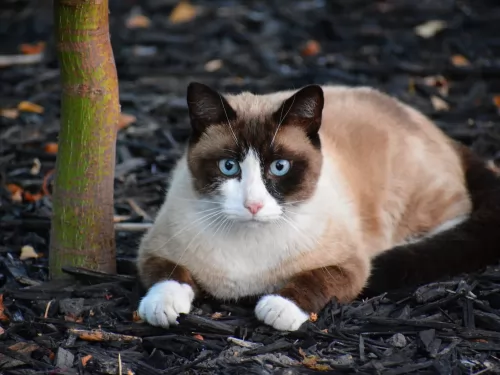 The Snowshoe is a short-haired, natural breed of cat. It is a bit similar in looks to the Siamese cat.
The Snowshoe is a short-haired, natural breed of cat. It is a bit similar in looks to the Siamese cat.
It was in the late 1960's that Dorothy Hinds-Daugherty from the USA devoted her time to developing a breed which was a mix of Siamese cat and American Shorthair. There was much enthusiasm for the new breed – the mesmerizing blue eyes and the lean, lithe, athletic body, .
This rare cat has been approved for championship status. In 1982 the Snowshoe was approved for championship status by the CFF and later by the American Cat Fanciers Association in 1990.
This beautiful cat has strict standards laid down for breeding.
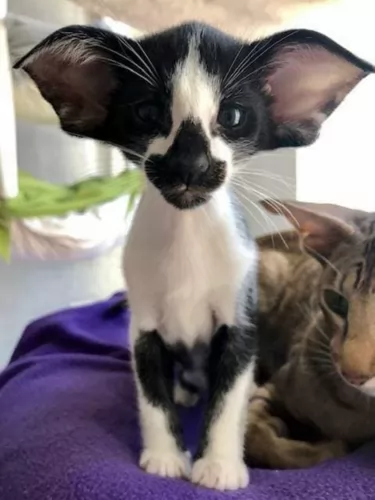 The Oriental Shorthair has a longish head with a slender neck and large ears. The legs are long and slender. The medium-sized cat weighs in the region of 3 – 5kg.
The Oriental Shorthair has a longish head with a slender neck and large ears. The legs are long and slender. The medium-sized cat weighs in the region of 3 – 5kg.
The eyes can be blue or green. Sometimes the cat will have one blue eye and one green eye. The coat is short and smooth and can be in a host of different colors.
The Oriental Shorthair is a curious, intelligent cat and they’re talkative too, loving to have conversations with their human family. They are cats that absolutely want to be part of the family. They don’t want to be left alone for too long either and get on well with children and pets in the home.
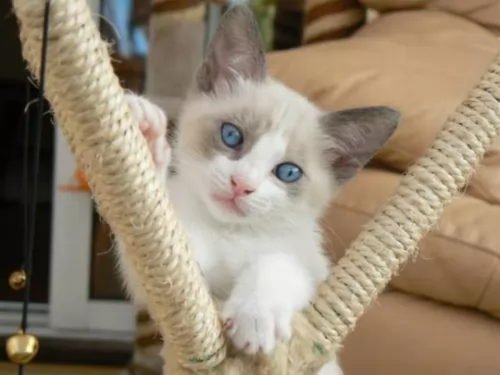 The Snowshoe is a medium-sized cat, with the body being longer than many other cat breeds.
The Snowshoe is a medium-sized cat, with the body being longer than many other cat breeds.
A distinctive feature with him is the white paws.
The cat can weigh between 5 to 7 kg. The legs of the cat are long and strong and the medium-length tail gradually tapers to a tip. The ears are fairly large with rounded tips. The smooth, short coat is white, brown, tan, and black and without an undercoat. He reminds you of a sweet treat - hints of chocolate and coffee shades with vanilla or light cream. He is pure white at birth, but after a few weeks, the coat undergoes a significant color change.
The face, ears, tail, and legs are darker in color than the rest of the body. The eyes of all Snowshoe cats are a sky blue.
Snowshoes are friendly, docile, and affectionate. They lap up the company of their human family, getting on well with children and other pets. They tend to be shy of strangers.
The Snowshoe is a fairly vocal cat and will let you know when he is hungry or he just wants to talk to you.
These cats are intelligent too and he can be taught a few tricks. He is very sociable and doesn’t like to be left on his own for long periods of time. Ideally, these cats should have a constant companion. They are active cats and like to be busy. You’ll need to spend some time with your Snowshoe as these cats love fun and games.
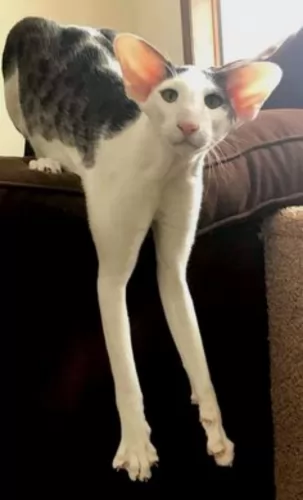 The Oriental Shorthair promises to be an active companion in your life. It’s a cat that likes to involve itself with all the activities that its human family takes part in.
The Oriental Shorthair promises to be an active companion in your life. It’s a cat that likes to involve itself with all the activities that its human family takes part in.
He is a great entertainer too, and he loves all the attention he gets, thriving on being the center of attention.
The Oriental Shorthair cat is slightly more quieter than the Siamese cat but he will still want to tell you what he’s doing and what he wants.
It’s a cat that has many many colors and shades, but the color extends to the cat’s personality. It has a colorful, interesting, inquisitive personality.
The cat is lively and social and will fit in best with a lively, active home where there are also animals to keep him company. By having this loving cat in your home and life, you bring in joy and happiness.
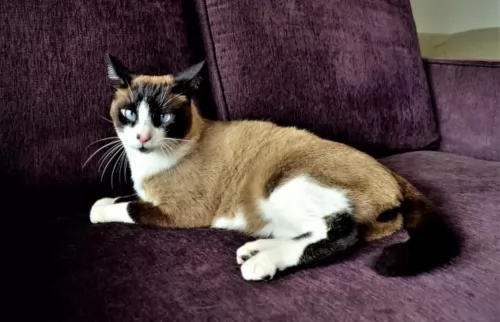 People who have already owned Snowshoes will tell you that they make splendid pets. They’re loyal and devoted to their human family, usually choosing a favorite person.
People who have already owned Snowshoes will tell you that they make splendid pets. They’re loyal and devoted to their human family, usually choosing a favorite person.
The fact that the Snowshoe is social and becomes so attached to people, makes him an awesome pet but just because he is fairly docile and amicable doesn’t mean he should be left alone for hours at a time. You’ll hear him voicing his displeasure at this.
He is certainly not a solitary cat, but an affectionate and most extraordinary cat.
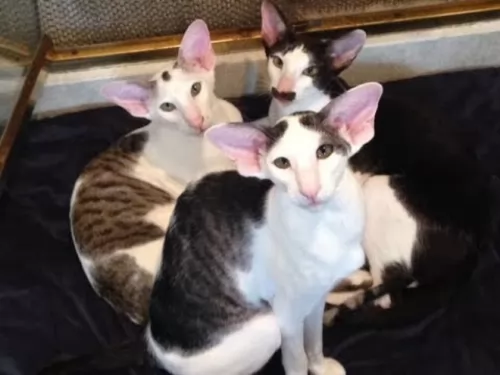 Oriental Shorthairs share some of the same health issues as Siamese cats. Make sure, if your cat shows signs of illness that you have pinpointed a vet in your area.
Oriental Shorthairs share some of the same health issues as Siamese cats. Make sure, if your cat shows signs of illness that you have pinpointed a vet in your area.
Things such as asthma, bronchial disease, lymphoma, neurological disorders, and gastrointestinal problems will need to be seen by the vet.
Think about having your cat spayed or neutered. Not only is this surgery important for preventing unwanted pregnancies, but it can also remove the urge for the cat to roam. The procedure has health benefits for your cat too.
Ensure that your Oriental shorthair has his vaccines up to date. These vaccines are important for preventing your cat from getting some deadly feline diseases. Kittens usually get the first vaccines between the ages of 6 and 8 weeks. Certainly, if you decide to go on holiday and you want to board your cat, the boarding kennels will require that the vet’s card and vaccines are 100% up to date.
Prevent parasites by using a treatment subscribed for your pet by the vet.
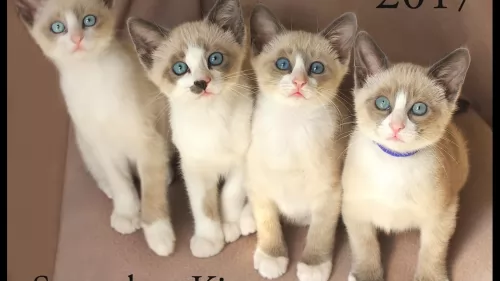 Your Snowshoe may well be a healthy breed, but every cat is prone to some illnesses. We look at some cat diseases you need to be aware of -
Your Snowshoe may well be a healthy breed, but every cat is prone to some illnesses. We look at some cat diseases you need to be aware of -
This is a feline disease found more often in Siamese cat breeds. The cat develops this protein disease between 1 TO 5 years of age. Amyloidosis is when there is an abnormal deposit of the protein complex amyloid into the liver, spleen and kidneys, resulting in bacterial infections, inflammation, and cancer.
Your Snowshoe’s teeth are particularly prone to gingivitis which is inflammation of the gums. It can lead to more serious conditions if left unattended. Other dental problems to watch for are bleeding gums, broken teeth, and swelling of the gums.
Have your Snowshoe spayed or neutered. Spaying or neutering decreases the likelihood of some cancers. Both males and females are less likely to roam too, making them more domesticated. The cat is less likely to spray urine as a territorial gesture too. Spaying or neutering is imperative if you want to avoid your cats being parents.
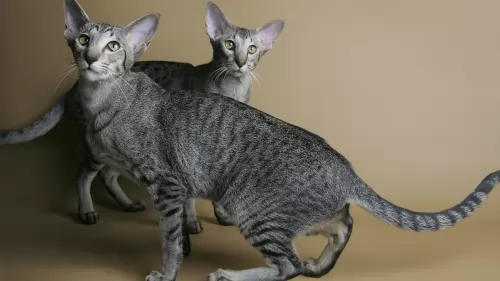 The short glossy coat doesn't shed much and the cat is considered low maintenance. A brush once a week will be adequate. A wipe down with a damp cloth will keep the cat dust-free and shiny.
The short glossy coat doesn't shed much and the cat is considered low maintenance. A brush once a week will be adequate. A wipe down with a damp cloth will keep the cat dust-free and shiny.
Just doing this for your cat is good for the cat’s morale as he thrives on attention, relishing the human interaction he gets during grooming.
Trim his nails, particularly if he is an indoor cat.
Keep your Oriental Shorthair lean and mean by not overfeeding him. The cat’s build is designed for slimness and he won't do at all well with the extra weight. The extra weight can lead to lots of health problems, one of which is diabetes.
If in any doubt as to how much to feed your cat, consult your vet about portion sizes. There are excellent commercially manufactured cat foods on the market, and the manufacturers know that cats are carnivores and that the best cat goods are high in protein.
Avoid giving your cat any kind of human food. Never leave him without a constant supply of fresh, cool water.
Provide your cat with a litter box and keep the box free of cat droppings. You can invest in small rakes from the pet shop and they make it easy to rake up the feces and dispose of them. Change the litter regularly too.
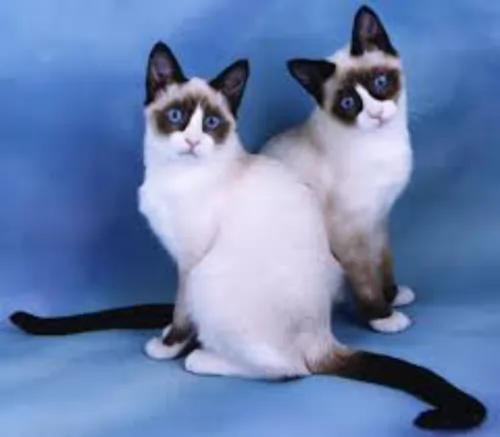 Provide your Snowshoe with the best cat food that there is. Always be aware of excess weight with your cat and avoid it at all costs. Extra weight is an influential factor in the development of diseases such as diabetes and arthritis.
Provide your Snowshoe with the best cat food that there is. Always be aware of excess weight with your cat and avoid it at all costs. Extra weight is an influential factor in the development of diseases such as diabetes and arthritis.
A proper diet for your Snowshoe will ensure that your vet expenses are less. The nutritional needs of your Snowshoe will be protein, minerals, vitamins, fatty acids, and enzymes. Your cat is a carnivore and his food needs to be high in meat and protein. He isn't going to require any carbohydrates. Speak to your vet about the best food for your feline friend.
Provide your Snowshoe with a constant supply of fresh, cool water.
Your Snowshoe will appreciate some cooked meat once in a while. Some tasty tuna now and then which is rich in omega-3s will also go down well.
Cats are fastidious about cleanliness so ensure his litter box is always clean. Scoop out the feces every day.
The Snowshoe has a low maintenance short coat, and a weekly brush will keep his coat shiny and glossy and he’ll love the attention this brushing session provides.
Cats like to scratch, so provide your Snowshoe with a scratching post as this will save your furniture from being used as a scratching post.
The Snowshoe cat is regarded as a low maintenance cat in terms of his short coat which needs to be brushed once a week. Brushing the hair will remove dead, loose hair and distribute skin oils to keep the coat in tip-top condition.